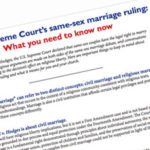In the wake of the Supreme Court decision legalizing same-sex marriage nationally, some religiously affiliated educational and benevolent institutions face unanswered questions about their policies.
In particular, denominationally related universities that receive state and federal funds for student financial aid and various grants—as well as child and family service agencies with government contracts for foster care or other services—wonder how the ruling may affect their employment practices and operations.
 Holly HollmanFor instance, if the employee of a Baptist institution married someone of the same sex, could that action alone be grounds for dismissal? If not, would the institution be required to extend to same-sex spouses the same benefits afforded to the spouses of other employees?
Holly HollmanFor instance, if the employee of a Baptist institution married someone of the same sex, could that action alone be grounds for dismissal? If not, would the institution be required to extend to same-sex spouses the same benefits afforded to the spouses of other employees?
“There are a lot of questions that are going to take time for us to figure out,” Holly Hollman, general counsel for the Baptist Joint Committee for Religious Liberty, said in a podcast.
“A variety of questions will come up for religiously affiliated institutions that have prohibitions on same-sex marriage—that believe that it is wrong and should not be sanctioned. It will take a while until we see how cases and conflicts arise and how they come out. But it is clear that it will depend on the development of other laws, because this decision—in and of itself—doesn’t answer those questions.”
At Baylor University, spokesperson Lori Fogleman said the school is studying the matter “to understand if it will impact us.”
University codes of conduct
In Texas Baptist life, universities affiliated with the Baptist General Convention of Texas require students to abide by a code of conduct. Some schools specifically prohibit “sexual intimacies outside of heterosexual marriage” or specifically bar “homosexual relations.” Others use more general language, saying, “physical intimacy is to be expressed in the context of marital fidelity.”
So, if two students of the same sex married this summer, would they be permitted to return to classes in the fall semester? Would they be eligible for on-campus married student housing? If challenged, would courts find student codes of conduct that bar homosexual behavior legally enforceable?
Sign up for our weekly edition and get all our headlines in your inbox on Thursdays
 Lanny Hall“The ramifications of this Supreme Court decision are very troubling. We simply do not know all the answers yet,” said Lanny Hall, president of Hardin-Simmons University in Abilene.
Lanny Hall“The ramifications of this Supreme Court decision are very troubling. We simply do not know all the answers yet,” said Lanny Hall, president of Hardin-Simmons University in Abilene.
“The decision could affect many areas of Christian universities, yet unknown. Many of the questions we have may be unanswerable at this time. We remain committed to our Christian mission and will do our best to meet the new challenges before us.”
Together with the administrators of other universities, Hardin-Simmons is working with legal counsel to seek answers, as well as looking for guidance from national Christian higher education organizations, Hall noted.
In addition to issues related to employment practices, religiously affiliated agencies that provide child and family services face additional questions—particularly regarding the homes in which they place children.
Generally speaking, the agencies fall into two broad categories. For-pay providers receive government funds, and no-pay providers do not.
Among BGCT-related institutions that work in foster care, for instance, Buckner Children & Family Services—an agency of Buckner International—and BCFS—formerly Baptist Child & Family Services—are for-pay providers.
Two BGCT-related child and family agencies—South Texas Children’s Home Ministries and Texas Baptist Children’s Home—are no-pay providers that accept no state or federal funds. However, under the Children at Heart Ministries umbrella, one sister agency of Texas Baptist Children’s Home, STARRY, is a for-pay provider, although it depends on donors for part of its work.
Issues for children’s homes
With regard to foster care, for-pay providers face the question whether they would be required to place a child in the home of a married same-sex couple who meet all other qualifications.
Anticipating the court’s decision, Buckner International formed an ad-hoc committee of its governing board to explore questions concerning foster care and, to some degree, adoption, said Scott Collins, Buckner’s vice president of communications.
At this point, Buckner is proceeding at a deliberate pace, giving the board time to consider the matter fully and waiting to see the full implications of the court’s ruling, he added.
“We’re hoping there is space for Buckner to continue as a foster care provider, because we believe that would be in the best interest of the children,” Collins said.
 Jim DenisonIn his daily “Cultural Commentary” June 30, Jim Denison, founding president of the Denison Forum on Truth and Culture, questioned whether religious organizations that object to same-sex marriage could lose their nonprofit tax-exempt status.
Jim DenisonIn his daily “Cultural Commentary” June 30, Jim Denison, founding president of the Denison Forum on Truth and Culture, questioned whether religious organizations that object to same-sex marriage could lose their nonprofit tax-exempt status.
“In 1983, the Supreme Court ruled that a school could forfeit its tax-exempt status if its policies ‘prescribe and enforce racially discriminatory admissions standards on the basis of religious doctrine,’” said Denison, former pastor of Park Cities Baptist Church in Dallas and theologian-in-residence with the Baptist General Convention of Texas.
“Change ‘racially’ to ‘sexually,’ and you’ve described thousands of faith-based universities in America. Change ‘admissions’ to ‘employment,’ and you’ve added thousands of faith-based organizations.”
Having secured “marriage equality,” some LGBT advocacy groups have cited protection in employment and housing as their next goal, Denison noted.
“Presumably, they will want legislation to cover employment and housing with religious organizations which support biblical marriage,” he wrote. “Would a church that declines to hire a person in a same-sex marriage lose its tax exemption? Would a school that declines to offer same-sex spousal benefits or housing face the same? Would federal student loans be withdrawn? Would government assistance for various programs be threatened?”
New BJC Resource
Threats to the loss of tax-exempt status have been overstated, according to a new resource from the Baptist Joint Committee for Religious Liberty.
“Any threat to the tax-exempt status of religious entities would require an expansion of the U.S. Supreme Court’s decision in Bob Jones University v. United States (1983),” the Baptist Joint Committee document states.
“That case—which upheld the revocation of tax-exempt status based on the university’s racially discriminatory admission policies—by its own terms does not apply to churches and has not been applied beyond racial discrimination in education. It is unlikely that the court’s decision in favor of same-sex marriage will have any effect on the 501 (c)(3) status of religious organizations that oppose same-sex marriage.”
The Baptist Joint Committee emphasized the court’s decision focused on marriage as a civil—not a religious—institution.
‘Does not remove separation of church and state’
“The court’s decision does not remove the separation of church and state,” the committee’s document states. “Churches will continue to make their own decisions about the marriage ceremonies they conduct. This was true before the decision and continues to be true.”
The ruling undoubtedly has religious liberty implications, but it was not a First Amendment case, the Baptist Joint Committee document notes. The decision did not settle every conflict or answer every question.
“The conversations will continue, and legal conflicts will not be worked out overnight,” the document states. “Harder questions, particularly about religiously affiliated institutions and religious objectors in the marketplace, will depend on the circumstances of each situation and the interplay of a variety of laws.”
















We seek to connect God’s story and God’s people around the world. To learn more about God’s story, click here.
Send comments and feedback to Eric Black, our editor. For comments to be published, please specify “letter to the editor.” Maximum length for publication is 300 words.